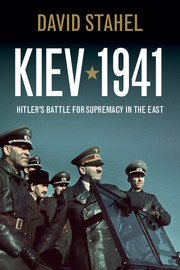Reviews of the hardback:‘David Stahel has written a remarkable book. Not only is it the fullest English-language account of the Battle of Kiev, based on an expert knowledge of the records of the German formations directly involved, but it is also a stimulating attempt to put what appeared to be Hitler's greatest victory into the context of his eventual defeat.'
Evan Mawdsley - author of Thunder in the East: The Nazi-Soviet War
‘David Stahel's new book on the battle of Kiev is a brilliant contribution to our knowledge of the German-Soviet war. Ranging widely over strategic debates within the high command, operational and tactical details of the fighting, the logistical situation behind the front, and industrial production at home, this is an essential book for any student of World War II. A major addition to the literature from a master scholar.'
Robert M. Citino - author of Death of the Wehrmacht: The German Campaigns of 1942
‘A fitting follow-on to Stahel's previous books, Kiev 1941 is a fresh, accurate, and authoritative volume. A thoroughly enjoyable read, it injects a healthy dose of realism into the history of this dramatic battle. Dismantling myths left and right, the book sets right one of the most significant stages of Operation Barbarossa.'
David Glantz - author of Barbarossa Derailed: The Battle for Smolensk, 10 July–10 September 1941
‘Building on his work in Operation Barbarossa and Germany's Defeat in the East, in Kiev 1941 David Stahel further highlights how German operational successes were no compensation for strategic miscalculation. Stahel uses a rich mix of German archival and other sources to provide a comprehensive analysis of the battle from a German perspective - a valuable contribution to the literature.'
Alexander Hill - author of The Great Patriotic War of the Soviet Union, 1941–1945: A Documentary Reader
‘Most original … a thoughtful and thought-provoking text.'
Richard Overy
Source: Literary Review
'… this book is essential reading for what was the greatest military encounter of the Second World War. In a succinctly worded, well-argued text, it has opened a new debate on the very ability of Nazi Germany to wage a major war … Stahel is to be congratulated for a controversial and stimulating book. It comes highly recommended.'
Source: Military History Monthly
‘[Stahel's] incisive survey cuts through much of the postwar myth making [and] shows mastery of the German sources … Issues of logistics and command are leavened by valuable insights into the strategic miscalculations of Hitler and his high command and vivid use of veteran testimony.'
Michael Jones
Source: BBC History Magazine
'Even readers familiar with the Russian theater of WWII will find much to intrigue them here, although the wonder of Stahel's book is how accessible it is to the non-specialist; in addition to recounting the history of a pivotal battle, [he] is very conscious that he's telling a story as well. A dark story – two evil nations tearing each other's guts out – but, in Stahel's hands, a powerful and a necessary one as well. A highly recommended account.'
Source: Open Letters Monthly
'Relying mainly on German sources, [Stahel] brings new evidence to bear on the conflict with the official war diaries of German divisions, as well as making good use of published editions of the private field-post letters and diaries of German soldiers of all ranks … overall [he] conveys extremely complex military action with exemplary clarity.'
Richard J. Evans
Source: The New Republic
‘Like [Stahel's] previous book, Kiev, 1941 is a magnificent work of historical revision, a first-rate example of how military history ought to be written.'
Mackubin Thomas Owens
Source: The Weekly Standard
'[Stahel] makes extensive use of the diaries and letters of German soldiers as well as works by and about German generals and political figures like Hitler and Goebbels – there are about a hundred pages of endnotes and bibliography. Excellent maps and tables clarify the complex military operations … To sum up, in this most detailed English-language treatment of the battle of Kiev, David Stahel furnishes ample evidence that, despite its Ukrainian victories in late September 1941, Germany remained ill prepared to defeat the USSR.'
Walter G. Moss
Source: Michigan War Studies Review
‘Stahel provides vivid depictions of the Ostheer's growing 'demodernization' … and convincingly shows that the victory in Ukraine was a result both of Hitler's insistence on turning his forces southwards and away from Moscow, and of Stalin's determination to hold on to Kiev despite the clear indications of a looming catastrophe.’
Omer Bartov
Source: The Times Literary Supplement
‘To historians with a serious interest in the Eastern Front in World War II, David Stahel is fast becoming a household name … While a number of historians before him have also dealt with the subject, Stahel has brought to his study a remarkable familiarity with primary and secondary German sources as well as a willingness to unambiguously re-address a question which has mystified generations of historians: did the Ostheer ever have a chance of inflicting crippling damage on the USSR in 1941?’
Klaus Schmider
Source: The Journal of Military History
'Stahel has written a well-balanced, often provocative … book, which sheds much new light on our knowledge of the fighting around the capital of the Ukraine.'
Martijn Lak
Source: The Journal of Slavic Military Studies
'… masterful … superbly researched and well written …'
Leo J. Daugherty, III
Source: The Journal of Slavic Military Studies





